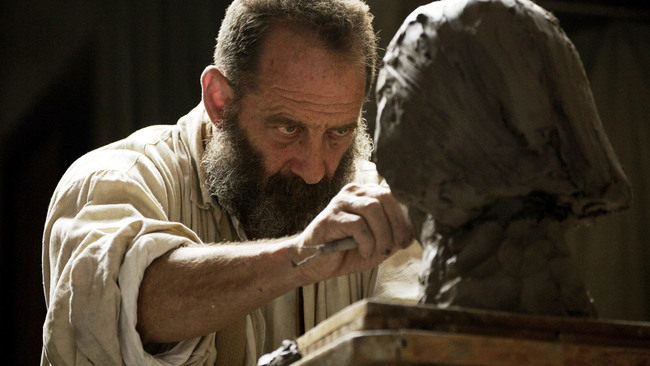Cannes 2017: Jacques Doillon’s Rodin

“It’s baffling that Jacques Doillon’s Rodin was granted one of the main-competition slots,” writes Manohla Dargis in her latest dispatch from the Cannes Film Festival back to the New York Times. “A handsomely mounted waxworks, it might have made sense as an out-of-competition attraction, good for its red-carpet value and that’s about it. The best that can be said of it is that its title subject—a male genius who uses and abuses women, some with very contemporary-looking bikini waxing—makes a fitting film-industry allegory.” In that, as she goes on to explain, the 70th anniversary bash the festival threw for itself on Tuesday only emphasized the fact that, Agnès Varda’s honorary prize aside, Jane Campion is the only woman to have won the Palme d’Or.
But we digress. “Rodin, Jacques Doillon’s biodrama about the career and love life of the famous French sculptor, is of a creakily reverent school of artist profiles,” writes the A.V. Club’s A. A. Dowd. “It’s the sort of movie where real-life characters speak with a phantom foresight of the things that will one day be written about them, where legacy is the topic of every other conversation, and where any serious personality flaw—in this case, a familiar case of wandering dick syndrome—is just folded into the subject’s complicated genius. All that excess passion has to go somewhere, right?”
“Starring Vincent Lindon (The Measure of a Man), who gives a physically imposing performance undercut by the film’s array of risible, borderline insufferable dialogue, Rodin at best provides insight into the great artist’s working methods, with the production design team convincingly recreating some of his most famous pieces,” writes Jordan Mintzer in the Hollywood Reporter. “But at worst, this stagy succession of scenes—many involving the sculptor’s spats and sexcapades with his doomed mistress Camille Claudel (Izïa Higelin)—is a lumbering affair that never builds into a gripping, let alone complex, portrait of the man or his time.”
“Those retaining fond memories of Bruno Nuytten’s Camille Claudel will be curious to see how Doillon reimagines Rodin and the central relationship in his life (apart from clay),” writes Jay Weissberg for Variety, “yet Rodin largely reinforces the earlier film’s story, shifting perspective of course but without significantly changing any of the personality traits—except Vincent Lindon’s Rodin is less egotistical than Gérard Depardieu’s. At least the 1988 film told a good story, with a sense of flow, whereas Doillon presents episodes in the sculptor’s life, separated by deadening black screens.”
“Indeed, the script—chronologically linear yet disjointed, averse to melodrama yet often clichéd in a ‘hello Monet, hello Rilke’ kind of way—is deeply inadequate,” agrees Time Out’s Dave Calhoun.
“Rodin doesn’t do Lindon, Doillon, or the artist himself any favors,” writes Nicholas Bell at Ioncinema.
What we have here is “a quite excruciatingly bad film,” finds the Guardian’s Peter Bradshaw. “The New Wave directors complained about a cinéma de papa. This is the cinéma de papa’s boring older brother.”
More from John Bleasdale (CineVue, 1/5), Allan Hunter (Screen), Fabien Lemercier (Cineuropa), and Barbara Scharres (RogerEbert.com).
Meantime, from Wednesday through June 7, the Cinémathèque française presents a series of films starring Vincent Lindon.
Update, 5/28: At the Film Stage, Jordan Ruimy notes that “the movie goes through three decades of Rodin creating art, yet he doesn’t look as if he’s aged at all. Doillon tries to dramatize Rodin, but makes it seem as if there wasn’t much drama to his story. Shooting the film in the actual locations of the historical events, and featuring the architecture encompassing a time and place where inspiration could come within an artist’s surroundings is a noble feat, but it alone doesn’t make a great film.”
Cannes 2017 Index. For news and items of interest throughout the day, every day, follow @CriterionDaily.



